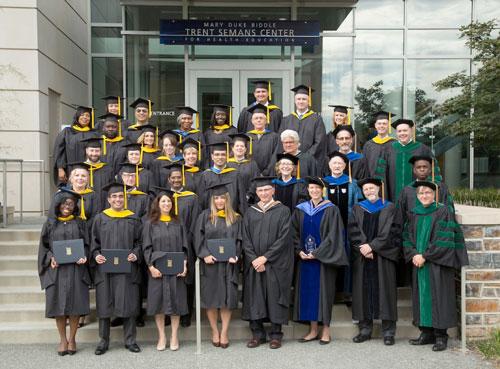
In August, 28 students graduated from Duke University School of Medicine’s Master of Management in Clinical Informatics (MMCi) program. Launched in 2010, this one-year program was created to meet a growing need for individuals whose skills span the technology, business and healthcare environments. The degree, comprised of seven business courses and five informatics courses, prepares graduates for careers in the “business of healthcare.”
“Healthcare is evolving, and with it the demands of those in academia, government and industry are growing. Healthcare professionals are now expected to have expertise in clinical informatics in order to provide superior healthcare,” says Kevin Schulman, MD, founding director of the program. Schulman is a Professor of Medicine and also serves as director of the Center for Clinical and Genetic Economics and as an associate director at the Duke Clinical Research Institute.
Starting its 6th class this year, the MMCI program attracts a broad array of graduate and post-graduate students including physicians, clinicians, and healthcare and IT professionals. Students from around the world with differing backgrounds provide a comprehensive perspective in the classroom and continue to benefit one another, according to Randy Sears, MMCi operations director.
Madhav Swaminathan, MD, a professor in Duke’s Department of Anesthesiology and a graduate of the program, said that through the program he has developed skills “to better navigate the health system from an operational perspective” and techniques to support the managerial aspects of his job. Amy Nordo, who has a background in nursing, found that MMCi’s diverse classroom contributed to her understanding of “what health care is from a global perspective.”
The MMCi program accommodates working professionals by using virtual learning and personal networking experiences in a weekend format that includes classes on Fridays and Saturdays. A multidisciplinary course selection provides a comprehensive learning experience in business, clinical informatics and ethics to prepare graduates for key managerial and executive positions.
The MMCi program creates an “immediate impact on people’s careers,” says Sears. As part of the program, students participate in a year-long professional development series geared to enhance their communication, interpersonal and teamwork skills. MMCi’s 137 graduates are now working in a variety of fields and positions including; manager, and senior associates in Healthcare Advisory at Price Waterhouse Coppers, director of business development at Polyglot, director of patient networks at Quintiles, and healthcare consultant at IBM Watson.